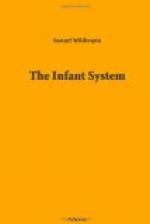Our first endeavour is, therefore, to excite a spirit of inquiry,—to foster that curiosity which is so natural to young children: till this is properly done, your information will not be well received, and it is most likely soon to be forgotten; but having once made them inquisitive, you are more likely to tire of communicating than they are of receiving. The skilful teacher will, indeed, rather leave them with an appetite still craving, than satiate them by repletion. I have frequently found the most beneficial results arise from the sudden cessation of a lesson or a lecture on an interesting topic. The children have looked for its renewal with the utmost impatience, pondering over what they had already heard, and anticipating what was yet to come with the greatest interest. Give a child a task, and you impose a burthen on him,—permit him to learn something, and you confer a favour.
Having excited a spirit of inquiry, the next endeavour is to direct it to proper objects. These, of course, will be things which relate to the senses of the child; the nature and properties of bodies, which may be ascertained by the application of those senses, &c. Having induced it to examine for itself, you are now to elicit its ideas of each object respectively; and having taught it to use its reason and judgment freely, and to express its own notions fearlessly and candidly,—you are to attempt the correction of what is erroneous, by putting forth your own views in as simple a way as possible: not so as to induce the child to give up its own opinions and adopt yours, but in such a way as to direct it to the attainment of truth; to induce a comparison between its thoughts and yours, and thus to discover its own error.
The powers of observation will speedily be improved under such a course of instruction, and in all the subsequent stages of existence, will not fail to constitute an independent and shrewd observer. But some may think we are straining the child’s faculties by the plan recommended,—overstepping nature’s laws,—and that the result must be detrimental to the child, both in mind and body. So far, however, is this from being true, that we have taken nature for our guide. We deprecate strongly, most strongly, that unnatural system, which gives children tasks so far beyond their powers, and for which their infantile faculties are not qualified;—we would lead them on in the path which nature has marked out—step by step—taking care that one thing should be thoroughly mastered before another is attempted.
The mental powers of children are far stronger than is generally supposed. No one who looks back to his early childhood, can fail of recollecting, that, at times, his thoughts would even then reach the very limits of human thought. All the powers of mind that are exercised in after-life display themselves in infancy, and therefore they all ought to be quietly and easily brought into exercise. This maybe




